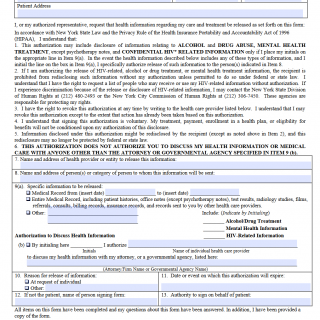HIPAA Authorization Form
The HIPAA Authorization Form is a document that enables individuals to authorize the release of their protected health information (PHI) to third-party entities. The primary purpose of the form is to provide individuals with control over their PHI and to ensure that their private health information is only shared with authorized parties.
The form consists of several critical sections, including the individual's name, contact information, and date of birth. It also includes the name and contact information of the party receiving the PHI, a description of the information being released, and the purpose of the release. Additionally, the form has an expiration date, which limits the time during which the authorization is valid.
The parties involved in the HIPAA Authorization Form include the individual authorizing the release of their PHI, the party receiving the information, and the healthcare provider or organization responsible for releasing the PHI. It is essential to consider the potential risks and benefits of releasing PHI before completing the form.
When compiling the HIPAA Authorization Form, individuals will need to provide their personal information, as well as the name and contact information of the party receiving the PHI. Additional documents, such as a power of attorney or legal guardianship papers, may be required in certain situations.
Application examples and use cases of the HIPAA Authorization Form include releasing medical information to insurance companies for billing purposes, authorizing research studies that require access to PHI, and sharing medical information with family members or caregivers. Strengths of the form include giving individuals control over their PHI, while weaknesses include the potential for unauthorized access or misuse of the information.
Alternative forms to the HIPAA Authorization Form include the HIPAA release form and the Consent to Release Medical Information form. These forms differ in the amount and type of information being released and the parties involved.
The HIPAA Authorization Form can significantly impact the future of the individuals involved as it determines who has access to their PHI. The form is typically submitted to the healthcare provider or organization responsible for releasing the information and is stored in the individual's medical records.
In summary, the HIPAA Authorization Form provides individuals with control over their PHI and enables them to authorize the release of their health information to third-party entities. It consists of critical sections and requires personal information and additional documents. It has various applications and use cases, strengths, weaknesses, and alternative forms. The form can significantly impact the future of the individuals involved and is typically submitted to the healthcare provider or organization responsible for releasing the information.

